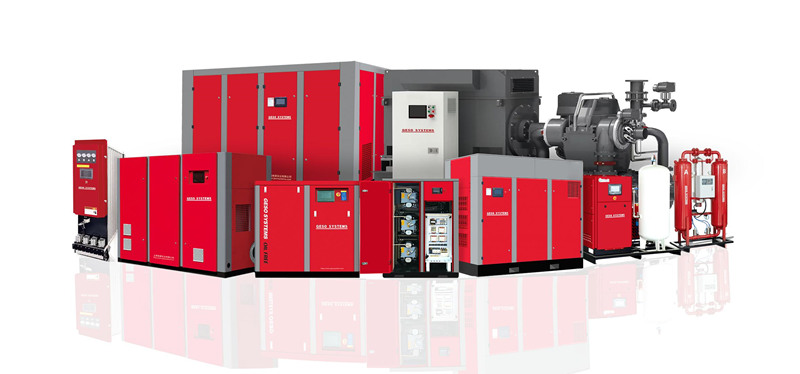
- English
- 简体中文
- tiếng Việt
- Indonesia
- שפה עברית
- Hrvatski
- Malti
- lugha ya Kiswahili
- Hausa
- Монгол хэл
- O'zbek
- Հայերեն
- Español
- Português
- русский
- Français
- 日本語
- Deutsch
- Italiano
- Nederlands
- ภาษาไทย
- Polski
- 한국어
- Svenska
- magyar
- Malay
- বাংলা ভাষার
- Dansk
- Suomi
- हिन्दी
- Pilipino
- Türkçe
- Gaeilge
- العربية
- Norsk
- český
- ελληνικά
- український
- Javanese
- فارسی
- Burmese
- български
- ລາວ
- Azərbaycan
- Slovenský jazyk
- Lietuvos
- Eesti Keel
- Română
- Slovenski
- தமிழ்
The air compressor industry ushers in a green revolution! Interpretation of the latest energy efficiency standards in 2025, how can enterprises seize the opportunity of energy conservation?
2025-07-04
Driven by the "double carbon" goals, the global manufacturing industry is embracing a green revolution. As a key power equipment in the industrial sector, the energy efficiency upgrading of air compressors has become an important breakthrough for enterprises to reduce energy consumption and emissions. In particular, leading brands represented by GESO Air Compressors took the lead in responding. Its BAE permanent magnet variable frequency series has obtained the national first-level energy efficiency certification, with an energy-saving efficiency 32% higher than that of ordinary models, making it the preferred solution for energy-saving transformations of industrial users. First-level energy efficiency air compressors are gradually becoming the new standard for industry procurement.
China Leads in Energy Efficiency Upgrading, New National Standards Reshape Market Landscape
With the full implementation of the GB 19153-2019 standard, China's air compressor industry has officially entered an era of high efficiency. Leading brands such as British GESO have achieved energy efficiency compliance for their full range of products. Take GESO's star product BAE-FC+ as an example. Equipped with dual-stage compression permanent magnet technology, it not only meets the first-level energy efficiency standard but also achieves dynamic energy saving through an intelligent joint control system. It has been successfully applied in green factory projects of enterprises such as Huawei and China National Petroleum. Industrial and information technology departments in many regions offer purchase subsidies of up to 15% (subject to local government policies) to enterprises adopting such high-efficiency models.
The new standard has refined energy efficiency grades into three gradients, among which first-level energy efficiency air compressors can save more than 30% energy compared to traditional models. Industrial and information technology departments in many regions have introduced supporting policies to provide tax incentives and subsidy support to enterprises using high-efficiency models. Industry insiders point out that 2024 will be a critical window period for eliminating low-efficiency models, and enterprises that lay out energy-saving technologies such as permanent magnet variable frequency in advance will gain a market advantage.
EU's New Regulations Drive Technological Innovation, Creating Opportunities for Chinese Manufacturing to Go Global
Facing the EU's mandatory requirement of a 30% industrial energy efficiency improvement by 2030, leading domestic air compressor enterprises are accelerating technological innovation. The latest intelligent variable frequency series launched by a renowned brand has exceeded the energy efficiency standards of the EU's ERP directive, gaining wide recognition in overseas markets. Experts suggest that export-oriented enterprises should focus on:
■ The EU's 2025 energy efficiency threshold enhancement plan
■ The carbon tariff mechanism's requirements for energy consumption throughout the equipment's life cycle
■ The application of intelligent IoT technologies in energy-saving management
Practical Guide for Enterprise Transformation (GESO Solutions)
(1) Equipment Upgrading Plan: GESO provides free on-site detection, issues customized renovation plans, and offers a special "trade-in" service. For replacing old equipment with first-level energy efficiency models, customers can enjoy a 5-year warranty for core components.
(2) System Energy-saving Package: Equipped with energy-saving technologies such as waste heat recovery and air pressure joint control, the overall energy consumption can be further reduced by 15%-20%.
(3) Policy Dividend Capture: Timely apply for special subsidies for energy-saving technological transformations to reduce investment costs.

Differentiated Global Market Layout: High-Efficiency Models Become Competition Focus
In the North American market, the U.S. Department of Energy is revising the MEPS standards for commercial air compressors, with stricter energy efficiency requirements expected to be implemented in 2025. Southeast Asian countries, meanwhile, use tax levers to encourage enterprises to purchase energy-saving air compressors. It is worth noting that with the increase in "Belt and Road" green infrastructure projects, the application proportion of China's independently developed two-stage compression permanent magnet models in overseas engineering projects has significantly increased.
Currently, driven by the dual forces of ESG investment concepts and carbon trading markets, the air compressor industry is shifting from pure price competition to energy efficiency value competition. According to industry association forecasts, by 2026, the market share of first-level energy efficiency air compressors in the domestic market will exceed 45%, and the global market size is expected to reach the tens of billions level. For manufacturing enterprises, seizing this round of energy efficiency upgrading opportunities is not only crucial for compliant operations but also a strategic choice to enhance international competitiveness.
(Note: The data in this article is sourced from public reports by the China General Machinery Industry Association and the EU Energy Efficiency Committee, and policy information is as of the latest version in 2024.)



